The lithium-sulfur solid-state batteries market is valued at USD 24.8 million in 2025 and projected to reach USD 274.7 million by 2035, recording an exceptional CAGR of 27.2%. A saturation point analysis highlights how long such accelerated growth can be sustained before tapering. From 2020 to 2025, revenue expands from USD 7.4 million to USD 24.8 million, reflecting the introduction and early adoption phase, supported by R&D efforts, prototype scaling, and initial pilot commercialization. The market is far from saturation, as growth is being fueled by innovation and emerging demand from electric mobility and energy storage applications.
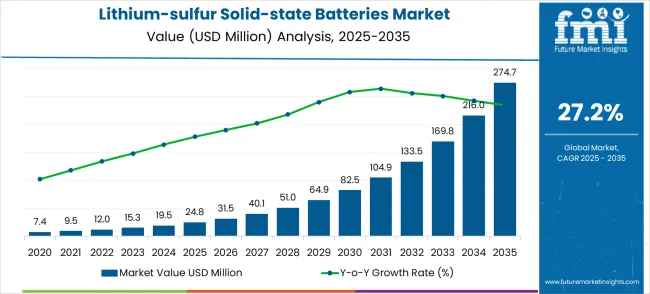
| Metric | Value |
|---|---|
| Estimated Value in (2025E) | USD 24.8 million |
| Forecast Value in (2035F) | USD 274.7 million |
| Forecast CAGR (2025 to 2035) | 27.2% |
Between 2025 and 2030, the market rises from USD 24.8 million to USD 82.5 million, showing that demand remains in the steep growth curve. This period highlights a transition from early adoption to broader commercialization, as more automakers, aerospace firms, and storage developers incorporate lithium-sulfur solid-state batteries into pilot programs. The adoption base is expanding, but the market is still in its acceleration phase with limited constraints on penetration. Since production scalability is still developing, saturation pressures are minimal, and growth rates remain consistently high without signs of slowdown.
From 2030 to 2035, revenue climbs further from USD 82.5 million to USD 274.7 million, reflecting continued high momentum. However, a saturation point analysis suggests that as the market nears 2035, early indicators of maturity could begin to appear. These include cost optimization pressures, increased competition from alternative solid-state chemistries, and slower incremental adoption in heavily penetrated segments. While the CAGR of 27.2% is expected to hold through 2035, saturation beyond this horizon could lead to a moderated growth trajectory. The period marks the final stretch of hypergrowth before the market potentially enters a stabilization phase, where wider adoption drives volume but narrows annual growth rates.
Market expansion is being supported by the exceptional energy density potential of lithium-sulfur chemistry and the safety advantages of solid-state electrolyte systems. Modern battery manufacturers are increasingly focused on developing solutions that can deliver higher energy storage capacity while maintaining enhanced safety characteristics compared to conventional lithium-ion technologies. The proven potential of lithium-sulfur solid-state batteries to achieve theoretical energy densities exceeding 2,500 Wh/kg makes them essential components of next-generation energy storage applications.
The growing emphasis on sustainable transportation and renewable energy integration is driving demand for advanced battery technologies that can support longer-range electric vehicles and more efficient grid-scale energy storage. Industry preference for battery systems that eliminate flammable liquid electrolytes while providing superior energy density is creating opportunities for innovative solid-state solutions. The rising influence of environmental regulations and carbon reduction targets is also contributing to increased investment in clean energy storage technologies across different sectors and applications.
The market is segmented by classification, application, and region. By classification, the market is divided into semi-solid type, all-solid-state type, and others. Based on application, the market is categorized into energy storage and transportation. Regionally, the market is divided into Asia Pacific, North America, Europe, Latin America, and Middle East & Africa.
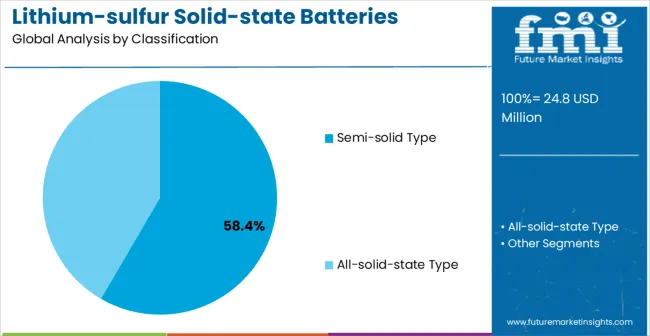
The semi-solid type classification is projected to account for 58.4% of the lithium-sulfur solid-state batteries market in 2025, reaffirming its position as the category's dominant technology approach. Battery manufacturers increasingly recognize the balanced advantages of semi-solid electrolyte systems that combine improved safety characteristics with practical manufacturing feasibility. This classification addresses both performance requirements and production scalability, providing a viable pathway for commercialization.
This classification forms the foundation of most development programs for lithium-sulfur solid-state batteries, as it represents the most technologically mature and commercially viable approach in the current market landscape. Research progress and manufacturing developments continue to strengthen confidence in semi-solid formulations. With increasing recognition of the need for practical solutions that can bridge current technology gaps, semi-solid type batteries align with both near-term commercialization goals and long-term performance targets. Their technical feasibility across multiple applications ensures sustained market dominance, making them the central growth driver of lithium-sulfur solid-state battery adoption.
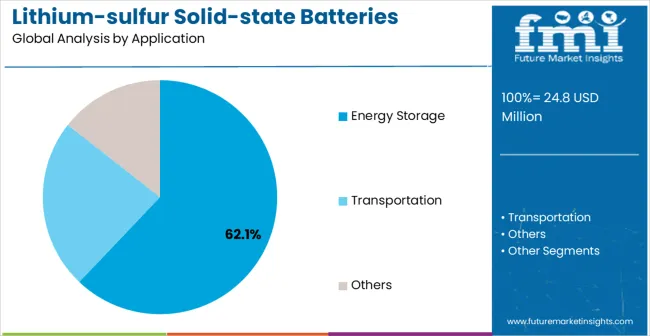
Energy storage is projected to represent 62.1% of lithium-sulfur solid-state batteries demand in 2025, underscoring its role as the primary application driving market development. Industry stakeholders recognize that stationary energy storage systems can better accommodate the current technological characteristics and cost structures of lithium-sulfur solid-state batteries compared to more demanding mobility applications. Energy storage applications offer enhanced flexibility in system design and operation that can optimize the unique advantages of this battery chemistry.
The segment is supported by the growing deployment of renewable energy systems requiring long-duration storage capabilities and the increasing need for grid-scale storage solutions that can provide high energy density. Additionally, energy storage systems are increasingly adopting advanced battery technologies that can deliver superior performance characteristics while maintaining operational safety. As understanding of lithium-sulfur solid-state battery capabilities advances, energy storage applications will continue to serve as the primary commercial pathway, reinforcing their essential position within the battery technology market.
The lithium-sulfur solid-state batteries market is advancing rapidly due to increasing demand for high-energy density storage solutions and growing investment in next-generation battery technologies. However, the market faces challenges including complex manufacturing processes, high production costs, and technical hurdles in achieving consistent performance. Innovation in materials science and production technologies continue to influence product development and market expansion patterns.
The growing development of specialized manufacturing processes is enabling more efficient production of lithium-sulfur solid-state batteries with improved consistency and performance characteristics. Advanced production facilities offer comprehensive quality control systems, including precise material handling and environmental control, that are particularly important for solid-state battery manufacturing. Scalable production technologies provide access to cost-effective manufacturing approaches that can support commercial viability.
Modern battery companies are incorporating advanced solid electrolyte materials such as ceramic and polymer-based systems, advanced cathode architectures, and protective coating technologies to enhance lithium-sulfur solid-state battery performance. These materials improve ionic conductivity, enable better sulfur utilization, and provide enhanced stability throughout battery lifecycle. Advanced material integration also enables optimized energy density and improved cycle life characteristics.
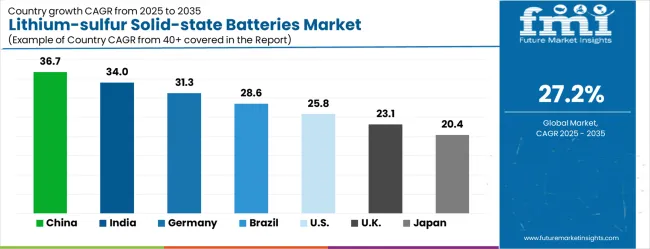
| Country | CAGR (2025-2035) |
|---|---|
| China | 36.7% |
| India | 34.0% |
| Germany | 31.3% |
| Brazil | 28.6% |
| USA | 25.8% |
| UK | 23.1% |
| Japan | 20.4% |
The lithium-sulfur solid-state batteries market is experiencing exceptional growth globally, with China leading at a 36.7% CAGR through 2035, driven by massive investment in battery manufacturing infrastructure, government support for advanced energy storage technologies, and aggressive electric vehicle adoption targets. India follows at 34.0%, supported by renewable energy expansion initiatives, growing energy storage requirements, and increasing focus on domestic battery manufacturing capabilities. Germany shows growth at 31.3%, emphasizing automotive industry transformation and advanced manufacturing excellence. Brazil records 28.6% growth, focusing on renewable energy integration and sustainable transportation solutions. The USA shows 25.8% growth, representing significant investment in advanced battery technologies and energy storage deployment.
The report covers an in-depth analysis of 40+ countries top-performing countries are highlighted below.
China is expected to record extraordinary expansion in lithium-sulfur solid-state batteries at a CAGR of 36.7% through 2035, driven by unprecedented government investment in advanced battery technologies and comprehensive support for next-generation energy storage solutions. The country's rapidly expanding battery manufacturing ecosystem and growing capabilities in solid-state battery research are creating tremendous opportunities for lithium-sulfur technology adoption. Major domestic and international battery companies are establishing comprehensive research and production facilities to serve the massive domestic market and global export opportunities.
India is witnessing expansion in lithium-sulfur solid-state batteries at a CAGR of 34.0% through 2035, supported by ambitious renewable energy targets, growing energy storage requirements, and increasing focus on advanced battery manufacturing capabilities. The country's substantial energy storage needs and commitment to clean energy technologies are driving demand for next-generation battery solutions. International battery companies and domestic manufacturers are establishing research and production partnerships to serve the expanding demand for advanced energy storage technologies.
The lithium-sulfur solid-state battery sector in Germany is forecasted to post a CAGR of 31.3% through 2035, supported by the country's leadership in automotive innovation and commitment to advanced manufacturing technologies. German automotive manufacturers and battery companies consistently invest in next-generation battery research and development programs. The market is characterized by advanced research capabilities, comprehensive industry collaboration, and established relationships between automotive companies and battery technology developers.
The lithium-sulfur solid-state battery sector in Brazil is anticipated to post a CAGR of 28.6% through 2035, driven by renewable energy sector expansion, increasing energy storage requirements, and growing focus on sustainable transportation solutions. Brazilian energy companies are increasingly adopting advanced battery technologies for grid-scale storage applications, supported by expanding renewable energy capacity and modernization initiatives.
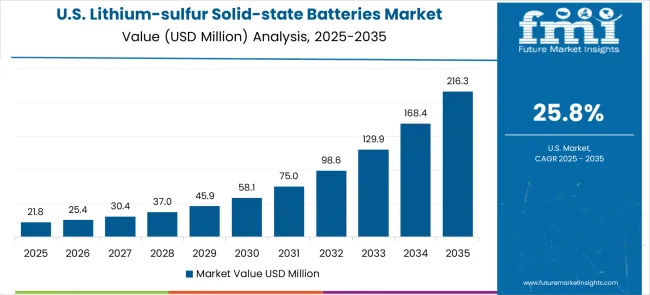
The United States is anticipated to experience growth in lithium-sulfur solid-state batteries at a CAGR of 25.8% through 2035, supported by substantial investment in advanced battery research and development, government funding for next-generation energy technologies, and growing deployment of grid-scale energy storage systems. American battery companies and research institutions consistently advance solid-state battery technologies through comprehensive research programs and industry collaboration.
Revenue from lithium-sulfur solid-state batteries in the UK is projected to grow at a CAGR of 23.1% through 2035, supported by comprehensive energy transition strategies and increasing investment in advanced energy storage technologies. British energy companies and research institutions emphasize development of next-generation battery solutions within integrated clean energy frameworks that prioritize grid stability and renewable energy integration.
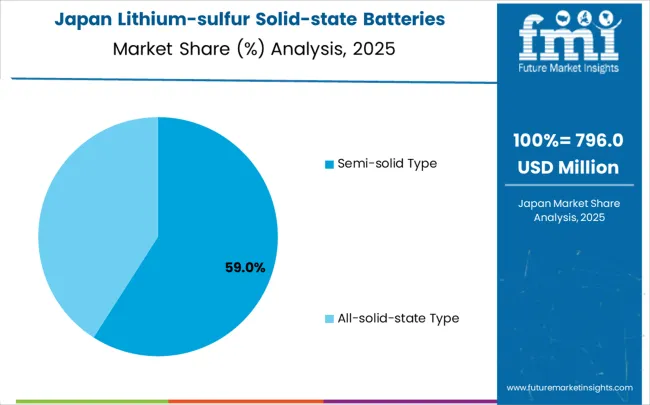
Japan is projected to witness growth in lithium-sulfur solid-state batteries at a CAGR of 20.4% through 2035, supported by the country's leadership in battery technology research and comprehensive approach to advanced energy storage solutions. Japanese battery manufacturers and automotive companies emphasize innovation-driven development of solid-state battery technologies within established frameworks that prioritize performance excellence and manufacturing precision.
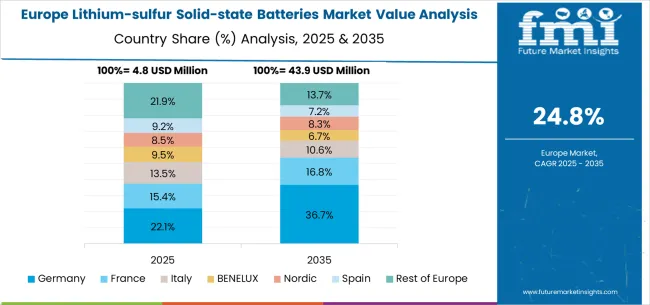
The lithium-sulfur solid-state batteries market in Europe is projected to expand rapidly through 2035, supported by increasing adoption of advanced battery technologies, rising investment in energy storage infrastructure, and ongoing innovation in next-generation battery solutions. Germany will continue to lead the regional market, accounting for 28.1% in 2025 and rising to 29.4% by 2035, supported by strong automotive industry integration, advanced manufacturing capabilities, and comprehensive research and development infrastructure. The United Kingdom follows with 22.3% in 2025, increasing to 23.1% by 2035, driven by energy transition initiatives, government support for advanced technologies, and expanding research collaboration networks.
France holds 18.7% in 2025, edging up to 19.2% by 2035 as energy companies expand advanced battery deployment and demand grows for grid-scale storage solutions. Italy contributes 12.4% in 2025, remaining stable at 12.6% by 2035, supported by renewable energy integration programs and growing industrial adoption. Spain represents 8.9% in 2025, moving upward to 9.1% by 2035, underpinned by expanding renewable energy capacity and increasing energy storage requirements.
Nordic countries together account for 5.2% in 2025, maintaining their position at 5.3% by 2035, supported by advanced clean energy initiatives and early adoption of innovative battery technologies. The Rest of Europe represents 4.4% in 2025, declining slightly to 1.3% by 2035, as larger markets capture greater investment focus and technology development resources.
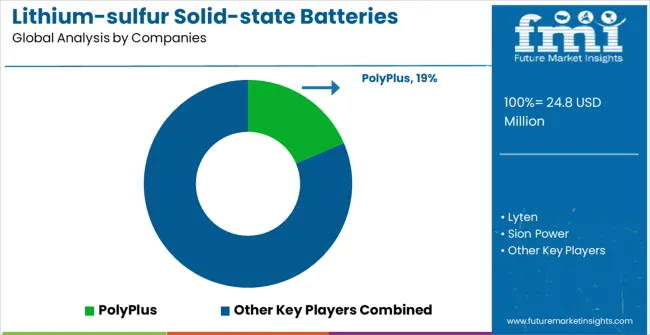
The lithium-sulfur solid-state batteries market is characterized by competition among advanced battery technology companies, established battery manufacturers, and innovative startup firms. Companies are investing in materials research, manufacturing process development, strategic partnerships, and technology commercialization to deliver high-performance, safe, and cost-effective battery solutions. Technology development, intellectual property protection, and market positioning strategies are central to strengthening competitive advantages and market presence.
PolyPlus leads the market with significant technological expertise in solid-state battery development, offering innovative lithium-sulfur solutions with focus on performance optimization and commercial viability. Lyten provides advanced battery technologies with emphasis on sustainable manufacturing and next-generation materials integration. Sion Power focuses on lithium-sulfur battery specialization and comprehensive technology development programs. Li-S Energy delivers established research capabilities with strong focus on commercial applications and market deployment.
NexTech Batteries operates with focus on advanced battery manufacturing and technology scaling capabilities. ZBT provides comprehensive battery research and development services with emphasis on solid-state technologies. LG Chem leverages extensive battery manufacturing experience to develop next-generation solid-state solutions. QuantumScape specializes in solid-state battery innovation with focus on automotive applications. Zeta Energy, Gelion, OXIS Energy (Johnson Matthey), Honda, CATL, and Shenzhen V&T Technologies provide diverse technological approaches and market access strategies to enhance overall market development and technology advancement.
| Items | Values |
|---|---|
| Quantitative Units (2025) | USD 24.8 million |
| Classification | Semi-solid Type, All-solid-state Type, Others |
| Application | Energy Storage, Transportation |
| Regions Covered | Asia Pacific, North America, Europe, Latin America, Middle East & Africa |
| Countries Covered | China, India, Germany, Brazil, United States, United Kingdom, Japan and 40+ countries |
| Key Companies Profiled | PolyPlus, Lyten, Sion Power, Li-S Energy, NexTech Batteries, ZBT, LG Chem, QuantumScape, Zeta Energy, Gelion, OXIS Energy (Johnson Matthey), Honda, CATL, Shenzhen V&T Technologies |
| Additional Attributes | Dollar sales by battery type and application, regional technology adoption trends, competitive landscape, industry partnerships and collaborations, integration with energy storage systems, innovations in solid electrolyte materials, manufacturing scalability analysis, and performance optimization strategies |
The global lithium-sulfur solid-state batteries market is estimated to be valued at USD 24.8 million in 2025.
The market size for the lithium-sulfur solid-state batteries market is projected to reach USD 274.7 million by 2035.
The lithium-sulfur solid-state batteries market is expected to grow at a 27.2% CAGR between 2025 and 2035.
The key product types in lithium-sulfur solid-state batteries market are semi-solid type and all-solid-state type.
In terms of application, energy storage segment to command 62.1% share in the lithium-sulfur solid-state batteries market in 2025.






Our Research Products

The "Full Research Suite" delivers actionable market intel, deep dives on markets or technologies, so clients act faster, cut risk, and unlock growth.

The Leaderboard benchmarks and ranks top vendors, classifying them as Established Leaders, Leading Challengers, or Disruptors & Challengers.

Locates where complements amplify value and substitutes erode it, forecasting net impact by horizon

We deliver granular, decision-grade intel: market sizing, 5-year forecasts, pricing, adoption, usage, revenue, and operational KPIs—plus competitor tracking, regulation, and value chains—across 60 countries broadly.

Spot the shifts before they hit your P&L. We track inflection points, adoption curves, pricing moves, and ecosystem plays to show where demand is heading, why it is changing, and what to do next across high-growth markets and disruptive tech

Real-time reads of user behavior. We track shifting priorities, perceptions of today’s and next-gen services, and provider experience, then pace how fast tech moves from trial to adoption, blending buyer, consumer, and channel inputs with social signals (#WhySwitch, #UX).

Partner with our analyst team to build a custom report designed around your business priorities. From analysing market trends to assessing competitors or crafting bespoke datasets, we tailor insights to your needs.
Supplier Intelligence
Discovery & Profiling
Capacity & Footprint
Performance & Risk
Compliance & Governance
Commercial Readiness
Who Supplies Whom
Scorecards & Shortlists
Playbooks & Docs
Category Intelligence
Definition & Scope
Demand & Use Cases
Cost Drivers
Market Structure
Supply Chain Map
Trade & Policy
Operating Norms
Deliverables
Buyer Intelligence
Account Basics
Spend & Scope
Procurement Model
Vendor Requirements
Terms & Policies
Entry Strategy
Pain Points & Triggers
Outputs
Pricing Analysis
Benchmarks
Trends
Should-Cost
Indexation
Landed Cost
Commercial Terms
Deliverables
Brand Analysis
Positioning & Value Prop
Share & Presence
Customer Evidence
Go-to-Market
Digital & Reputation
Compliance & Trust
KPIs & Gaps
Outputs
Full Research Suite comprises of:
Market outlook & trends analysis
Interviews & case studies
Strategic recommendations
Vendor profiles & capabilities analysis
5-year forecasts
8 regions and 60+ country-level data splits
Market segment data splits
12 months of continuous data updates
DELIVERED AS:
PDF EXCEL ONLINE
Military Batteries Market Analysis & Forecast by Platform, Capacity, Type, End-Use and Region through 2025 to 2035
Zinc-Air Batteries Market Growth – Trends & Forecast 2023-2033
Golf Cart Batteries Market Size and Share Forecast Outlook 2025 to 2035
Submarine Batteries Market Analysis - Growth & Forecast 2025 to 2035
Sodium-Ion Batteries Market Analysis - Size, Share, and Forecast Outlook 2025 to 2035
Rechargeable Batteries Market
Sodium Sulfur Batteries Market Size and Share Forecast Outlook 2025 to 2035
Locomotive Lighting Batteries Market Analysis - Size, Share & Forecast 2025 to 2035
Two-Wheeler Lead Acid Batteries Market Analysis - Size, Share, and Forecast Outlook 2025 to 2035
Thin Film and Printed Batteries Market Trends - Growth & Forecast 2025 to 2035
Thermal Management Materials for EV Batteries Market Size and Share Forecast Outlook 2025 to 2035
Adhesives for Electric Vehicle Power Batteries Market Forecast and Outlook 2025 to 2035

Thank you!
You will receive an email from our Business Development Manager. Please be sure to check your SPAM/JUNK folder too.
Chat With
MaRIA